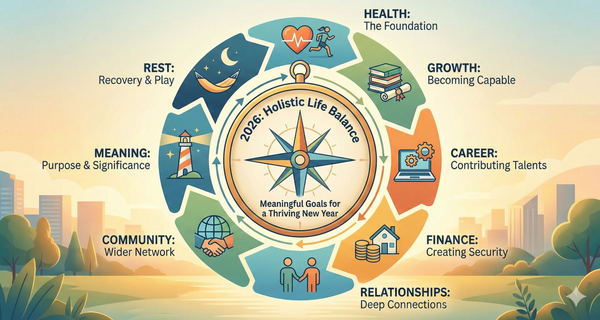Journaling for Meaningful Reflection
Journaling for Meaningful Reflection
In a world filled with noise and distractions, the quest for clarity and purpose can feel overwhelming. We often look outside ourselves for answers, but what if the most profound insights were waiting within our own minds? This is the promise of journaling for meaningful reflection. It’s a practice that transforms a simple notebook into a powerful tool for self-discovery, a private space to engage in a deep inner dialogue and courageously ask the big life questions. Forget the high-school diary filled with daily events; we are talking about a transformative practice that can bring meaning and intention to the forefront of your life.
What is Journaling for Meaningful Reflection?
At its core, journaling for meaningful reflection is the intentional act of writing to understand yourself and your life on a deeper level. It goes beyond merely recording what happened in your day. Instead, it prioritizes exploring your thoughts, feelings, and reactions to those events. It’s the difference between saying “I had a stressful meeting” and asking “Why did that meeting cause me so much stress? What fears or values did it trigger?” This simple shift from reporting to questioning is where the magic lies, turning your journal into a dynamic space for growth.
Beyond the Daily Diary: Engaging in a Rich Inner Dialogue
Think of your journal as a trusted confidant with whom you can have a completely honest conversation. This is the practice of cultivating a rich inner dialogue. Often, our thoughts are fleeting, chaotic, and repetitive. The act of writing them down forces us to slow down, give them structure, and examine them with curiosity rather than judgment. You can ask your journal questions, debate your own assumptions, and comfort your own fears on the page. This externalized dialogue helps you detach from overwhelming emotions and see your own thought patterns with surprising objectivity and compassion.
The Proven Benefits: Clarity, Purpose, and Peace
Engaging in this practice isn't just a feel-good exercise; it has tangible benefits. Consistently exploring your inner world through writing leads to incredible mental clarity. The fog of confusion and indecision begins to lift as you connect with your authentic wants and needs. This clarity is the foundation for a stronger sense of purpose. When you understand your values and what truly matters to you (the journaling meaning), you can make more intentional choices. This alignment reduces internal conflict and quiets mental chatter, leading to a profound sense of peace and well-being.
Your Toolkit: How to Begin Your Journaling Journey
Starting can be the hardest part, often because we overcomplicate it. The beauty of journaling is its simplicity. You don't need expensive tools or elaborate setups. All you need is a willingness to show up for yourself and a medium to capture your thoughts. The goal is to make the process as frictionless as possible to encourage consistency.
Choosing Your Medium: The Great Debate of Digital vs. Paper
The choice between a physical notebook and a digital app is purely personal. A traditional pen and paper offers a tactile, screen-free experience that many find meditative. The physical act of writing can slow down your thoughts and improve retention. On the other hand, digital journaling apps offer convenience, password protection, searchability, and the ability to journal anywhere you have your phone or computer. Don't get stuck here. Choose one and begin. The right tool is the one you consistently use.
Creating a Consistent Practice: Ritual and Routine
Habits are built on consistency, and journaling is no different. Tying your practice to an existing routine, like your morning coffee or right before bed, dramatically increases your chances of success. Designate a specific time and a quiet space where you won't be interrupted. Start small—even five minutes a day is powerful. Overcoming the "blank page fear" is key. If you don't know what to write, simply write that: "I don't know what to write today, but I'm here anyway." More often than not, the thoughts will begin to flow.
Prompts and Techniques for Deeper Meaning
Once you’ve established a routine, you can begin to explore more structured techniques. While simply writing whatever comes to mind is valuable, using prompts and specific methods can unlock new layers of insight and guide you toward the journaling meaning you seek. These are tools to help you dig deeper when you feel stuck or want to explore a specific area of your life.
Exploring the Big Life Questions
Your journal is the perfect place to grapple with life's most important questions without pressure or judgment. Pondering these questions on the page allows for an honesty that is often difficult in conversation. It helps you uncover your core beliefs and define your path. Try exploring some of these: What does a "meaningful life" look like for me? What are my core values, and am I living in alignment with them? If fear were not a factor, what would I do? What activities make me lose track of time? When do I feel most authentic?
Stream of Consciousness: Tapping Into Your Authentic Voice
This technique is a cornerstone of authentic inner dialogue. The instruction is simple: set a timer (10-15 minutes is a great start) and write continuously without stopping. Do not pause to correct spelling, grammar, or punctuation. Don't judge the thoughts or try to steer them. The goal is to create a direct line from your brain to the page. This practice helps you bypass your internal censor and uncover the raw, unfiltered thoughts and feelings that lie beneath the surface. It is a powerful way to understand what's truly on my mind.
Themed Journaling: Gratitude, Challenges, and Future-Self
Focusing your journaling on a specific theme for a period can yield powerful breakthroughs. A gratitude journal, where you list things you are thankful for each day, is scientifically proven to improve happiness. Another technique is to write about a current challenge in detail, exploring it from multiple angles to find a solution. A particularly powerful exercise is to write a letter to your future self (one, five, or ten years from now), outlining your hopes, dreams, and intentions. This creates a vision to work toward and serves as a fascinating record of your own evolution.
Conclusion: Your Pen, Your Path to Meaning
Journaling for meaningful reflection is more than just a habit; it's an act of radical self-care and a commitment to living an examined life. It is your private sanctuary to hold a compassionate inner dialogue, your laboratory to experiment with answers to life's biggest questions, and your compass for navigating the path to journaling meaning. The journey of a thousand miles begins with a single step, and your journey to a more meaningful life can begin with a single sentence. So pick up your pen, open a new document, and ask yourself a simple question: What's on my mind right now? The answer may surprise you.




